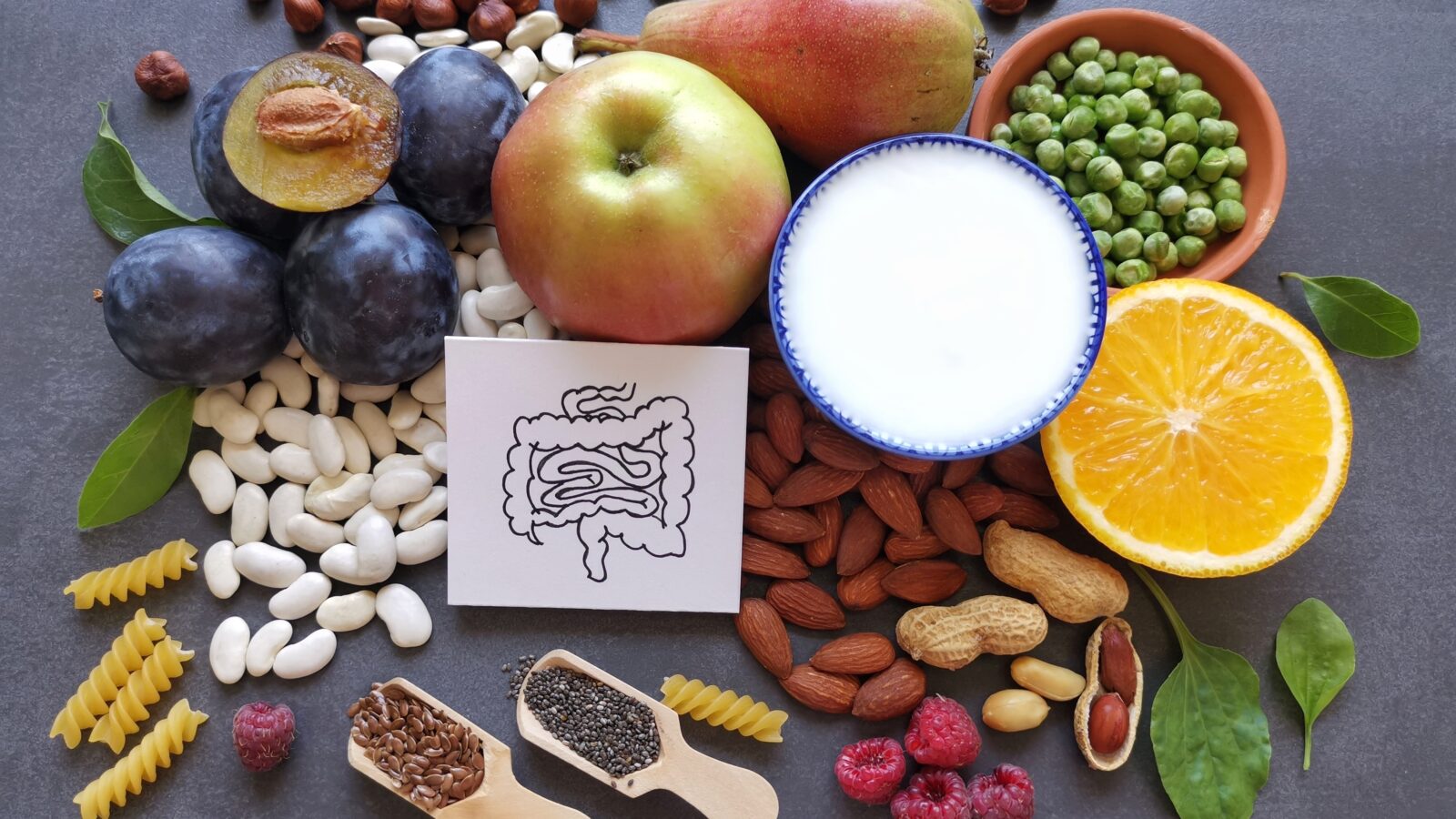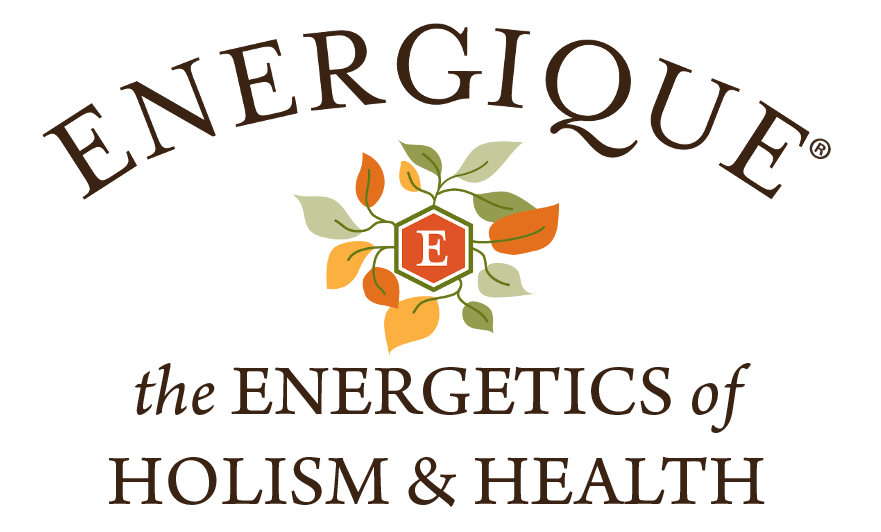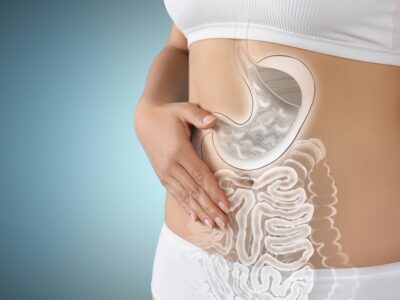Many functional digestive disturbances can be linked to dysbiosis, or an alteration of the normal and healthy composition of the gut’s microbiome. Probiotics are an effective way to support a healthy balance of the right bacteria in the gut, and while probiotics are integral to many holistic protocols for digestive health, it is also important to recognize when there is a deeper underlying cause. A common inciting cause of dysbiosis is the therapeutic use of antibiotics, which can decimate healthy bacterial populations in the colon, but even in these cases the maintaining cause can be more complex. In other cases, the microbiome can be disrupted by other factors in the absence of antibiotic use. It is important to remember that bacteria are living organisms, and need nourishment to survive. What often triggers the overgrowth of unhealthy bacteria in the gut is nothing more than an abundance of fermentable substrate, in other words normal food that has been poorly digested, poorly absorbed, or both. The digestive process directly aids nutrient absorption, so weak or impaired digestion can alter the gut microbiome in two ways: by leaving more energy-rich bonds intact for fermenting bacteria, and providing additional nutrients for these organisms to thrive.
For this reason, undigested food is indeed one of the main causes of gas, bloating, and abdominal cramps. While the gut is supposed to be more or less sterile from the stomach to the small intestine, the large intestine hosts an abundance of both probiotic and potentially harmful bacteria, the latter usually in lower concentrations that do not become troublesome unless they are fed with food substances that the healthy human gut would normally digest. Regardless of whether the microbiome is in a healthy condition or not, over-feeding it with an abundance of undigested foods will not only create excessive fermentation, which can lead to gas, bloating, cramping, and even constipation, it can also alter the microbiome unfavorably by feeding too many of the wrong bacteria.
Both constipation and diarrhea can be the result of a disrupted microbiome; it depends on which type of bacteria become dominant. Some maladaptive bacterial strains in the colon will ferment undigested food into hydrogen sulfide, which tends to accelerate transit through the gut and can lead to diarrhea. Other strains produce methane, which has the opposite effect of stunning the motor complex responsible for normal bowel transit and slowing things to the point of constipation. While probiotics can be extremely helpful in both cases, it’s also important to address the root of the problem, too much undigested food. Both animal and vegetable foods can be equally causative here: nothing should ever be left to rot, ferment, or putrefy in the human colon, and normally by the time food reaches the colon, it has been digested and absorbed to the point that it cannot be utilized as energy by anything except for the most harmless microorganisms.

Some people tend to blame certain classes of foods more so than others for this effect, and both a vegan diet and a carnivore diet have been touted by different experts as a solution to dysbiosis. The reality is that no one-size-fits-all dietary approach is likely to work best for everyone. The problem is not what is being eaten, but rather what is not being digested. Due to individual factors, different people with different constitutions tend to be better or worse at digesting certain foods. Factors like hypochlorhydria, zinc deficiency, or energetic patterns that inhibit the stomach can make it more difficult to digest protein, whereas most plants and starches do not require the stomach for digestion at all. A deficiency of pancreatic enzymes or conditions like hyperthyroidism which can speed transit through the gut are more likely to result in difficulty fully digesting high-fiber foods. To do the most good for patients, one truly needs to go beyond just “treating the gut” by identifying and treating with targeted approaches the specific parts of the gut that are malfunctioning.
Although digestion technically begins in the mouth, the main sources of digestive power are the stomach, gallbladder, pancreas, and small intestine. The following is a very brief guide to identifying and supporting digestive function at each of these organ systems.
Stomach: signs of weak stomach function can include digestive symptoms occurring very soon after meals, low appetite with easy satiety, an aversion to or intolerance of animal protein, and specific symptoms like heartburn. Fatigue and anemia can also be signs pointing to poor stomach function, due to its role in normal vitamin B12 absorption. Diagnostic tests can reveal low stomach acid, which is usually the culprit, and possibly low vitamin B12 levels. Some ways to support the stomach include zinc supplementation, which is necessary for the production of stomach acid, herbal bitters which work through the nervous system to stimulate stomach function, and products containing betaine HCl, which can supplement low stomach acid.
Liver/Gallbladder: fat intolerance, especially to fried food, is one of the main giveaways that the liver or gallbladder need support, as bile is necessary to efficiently digest fat. Other signs may include fatigue after meals, light-colored stools, upper back and shoulder pain (referred from the gallbladder), indigestion after onions or spicy food, and nausea. While classic bitters promote stomach function, cholagogue herbs such as dandelion, celandine, and fringe tree bark are preferable to support the production and flow of bile. Other ways to support the liver and gallbladder include hepatoprotective herbs, choline, and digestive supplements containing ox bile.
Pancreas: the pancreas is arguably responsible for the majority of digestion, yet this silent organ is often overlooked as a cause of indigestion. While type II diabetes involves dysfunction of the endocrine pancreas, it can also progressively lower its exocrine function leading to pancreatic insufficiency. Alcoholism and cystic fibrosis can also decrease pancreatic function over time, though not everyone with pancreatic insufficiency may have these disorders. Pancreatic enzymes accomplish the majority of digestion for fat, carbohydrate, and protein, and signs that this organ is in need of support tend to involve malabsorption, since so little gets digested. This can take the form of weight loss and undigested food in the stool, especially greasy or oily stools. Lab tests are available to analyze the stool and determine which macromolecules are passing undigested, which helps inform the choice of supplemental enzymes. Proteases, lipases, and amylases will help digest proteins, fats, and carbohydrates respectively, and pancreas extracts are a natural way to supplement all three.
Small Intestine: while the small intestine is mostly geared for nutrient absorption, it does play an important role in digesting sugars, carbohydrates, and even some small proteins. Brush border enzymes along the lining of the small intestine are designed to break down small molecules that can otherwise ferment to cause gas and bloating in the colon, including less-commonly encountered carbohydrates like lactose in dairy products and trehalose in mushrooms. Besides an intolerance to these foods, signs of problems in the small intestine include delayed indigestion (onset of symptoms several hours after meals), food allergies, widespread nutrient deficiencies, and intolerance of many processed food ingredients like carrageenan, maltodextrin, and modified starches. The intestinal lining is delicate and needs constant regeneration, meaning vitamins A, D, and zinc are crucial to supporting this organ. Herbally, carminatives like cinnamon and fennel can help reduce gas and the discomfort of bloating, while soothing demulcents like slippery elm and chamomile can support the intestinal lining.
When Basic Support Isn’t Enough: Consider SIBO
Because the best way to prevent dysbiosis is through proper digestion and absorption of nutrients which can otherwise feed unwanted bacteria, those who have struggled with digestive issues for a long time are at risk of developing more stubborn colonization throughout the digestive tract. Small Intestinal Bacterial Overgrowth (SIBO) has been increasingly recognized as a factor in continuing digestive problems. Unlike the large intestine, the small intestine is not supposed to be colonized by bacteria at all, not even probiotic strains, and when this happens it can be stubborn to eradicate. A low-FODMAPS diet combined with cleansing products for the small intestine is often recommended, with the intent being to provide a minimum of fermentable foods and to make the small intestine inhospitable to bacteria until its natural balance is restored.
A common question is whether it makes sense to continue using probiotics while being treated for SIBO. While some have expressed concerns about adding live cultures to a gut already suffering from bacterial overgrowth, most research suggests these concerns are unfounded, and that continuing probiotic use may even be beneficial1. Because probiotics can help modulate the gut by interacting directly with the immune system, they remain a useful addition to almost any digestive health protocol.
For more information on specific protocols, download Energique’s Protocol Guide to Digestive Support. (You must be an Energique registered practitioner to access these exclusive protocol guides. If you are not an Energique registered practitioner, you can easily create a free account at this link.)
- Probiotics for preventing and treating small intestinal bacterial overgrowth: a meta-analysis and systematic review of current evidence. Zhong C, Qu C, Wang B, Liang S, Zeng B. J Clin Gastroenterol. 2017;51:300–311. doi: 10.1097/MCG.0000000000000814. ↩︎


 Does Fluoridated Water Cause Bone Spurs?
Does Fluoridated Water Cause Bone Spurs?